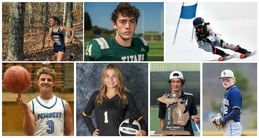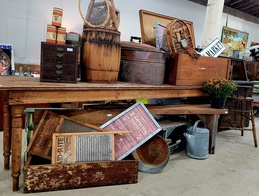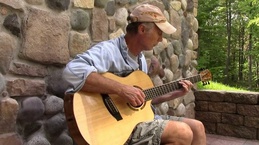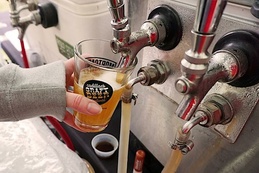Local Heroes: Firefighters put our Values back in Focus after the 911 Attack
March 6, 2002
It was a heart-wrenching scene as firefighters sifted through the rubble at Ground Zero last fall -- searching not only for people who worked at the World Trade Center, but also for fallen comrades who perished while trying to save lives.A new-found respect for firefighters swept across the country, and while we hope to never
see such a tragedy in these parts, it made us keenly aware of just what firefighters are willing to do if necessary.
We spoke recently with Art Shaw, public safety officer for the City of Petoskey. In addition to being a firefighter, EMT, and police officer, Shaw is a state-certified fire investigator, a public educator on fire prevention, and a fire systems inspector for new construction.
NE: Tell me about the fire department in Petoskey.
Shaw: We‘re a combination department. All of our full-time people except one are police, fire and EMS, and the other individuals are paid on call. We take in the original city limits and the Bay Harbor Development that‘s now part of the city.
NE: What kind of training do you need to become a firefighter?
Shaw: The state has mandated that volunteer or paid-on-call people have to be trained to a Firefighter 1 level, and full-time firefighters have to be trained to Firefighter 2 level. The idea is that fire doesn‘t care whether you‘re a full-time or a part-time person -- it still burns the same. And it burns the same in Detroit as it does in Petoskey or Traverse City, so the state has mandated a minimum level of training for everybody.
NE: What‘s involved in the training?
Shaw: The majority of it is classroom, but there are some practical, hands-on skills, too. They get into the basic chemistry of fire, water supplies, hoses, hand tools, first aid, fire prevention training... there‘s a lot of specific things involved in the training.
NE: What kind of personality does it take to be a firefighter?
Shaw: You‘ve got to be willing, like they say, to run into a burning building when everybody else is running out. So it does take a different personality and also somebody that has a dedication to their community. But everybody has their own little niche. I tell people I could never work in a nursing home. You‘ve got to respect those people -- they‘re dealing with situations that I‘d have a hard time dealing with.
NE: Is that commitment to the community one of the main reasons why the volunteers and paid-on-call people get into it?
Shaw: I think it‘s mainly interest. I will say, though, that with the hours of training and with the demands that people have today with work and family, they just don‘t have the time anymore. So some areas are having trouble trying to recruit paid-on-call firefighters.
NE: I‘ve heard that some people really like the adrenaline rush that goes along with it.
Shaw: That could be part of it. When that alarm goes off at night, there is the adrenaline rush instantly.
NE: What are some of the challenges firefighters face when they go out on a call?
Shaw: Probably one of the bigger ones is driving... you‘ve got to get to the scene safely, and when the alarm goes off and the adrenaline dump is there, sometimes people kind of lose focus. They think they‘ve got to get there at all costs and that‘s not the case. We have to get there and get there safely without injuring anybody else in the process.
NE: Have there ever been accidents like that in the area?
Shaw: Not around here lately, but there have been in the past, all over the countryside. There‘s a special driver‘s training program that‘s required as part of the basic firefighting, and it‘s no different whether you‘re driving your own personal vehicle or a fire apparatus or ambulance. If you get into an accident, you‘ve now made things worse. More resources have to continue on to wherever you were going, and now you‘ve got to get resources to come to where the accident took place. That‘s not what you‘re after.
NE: How much do firefighters make in Northern Michigan?
Shaw: It varies, depending on the community, especially for the paid-on-call people. Some people get
so much per run and get paid maybe once a year or quarterly, based on the number of calls. Others
might not receive actual cash, they may receive some other form of compensation, maybe in the form
of health insurance.
NE: How did people in your department feel about the World Trade Center tragedy?
Shaw: I don‘t think we‘re any different than anybody else in our reactions to the incident. You
recognize some of the inherent dangers of the job, but some of them are not inherent. Some of them
are what people do in terms of what they store that we don‘t know about.
NE: Did you have any special meetings to talk about what happened at the World Trade Center?
Shaw: No, we‘re small enough that we talk among ourselves. Myself and two other inspectors were
down at the Michigan Fire Inspectors Conference when it happened. We had to decide whether to
continue the conference or adjourn, and then figure out how many people had to leave who were part
of emergency response teams that would end up going. We ended up continuing and improvising
some of the programs, because our speakers couldn‘t fly in at that point.
NE: So were there firefighters throughout the country that went to New York to help out?
Shaw: Yes, some areas have teams skilled in rescue and collapsed buildings. Some of the people at our
conference left because they were part of the teams that responded to New York.
NE: It really made people more aware of the firefighter‘s job.
Shaw: People don‘t understand that firefighting is a science. They just assume that all you do is squirt water, but there‘s an actual science about how to apply the water to the fire, and you have to understand building construction and the chemistry of fire. It‘s not just an arbitrary thing. It‘s a learned skill.
NE: As an inspector with some good insight, what would be the one thing you would tell people about preventing a fire?
Shaw: Think. Engage your brains. Last summer, we had a fire where two houses were destroyed as a result of improper disposal of furniture refinishing materials. Read the instructions on the containers. And plan. What if you had a fire? How are you going to react? How are you going to get out of your home? Do you have two ways out? Do you have a meeting place? For a business, who‘s going to call the fire department? Who‘s going to get your customers out of the building? Who‘s going to account for all the employees in that building? Those are just basic things people need to think about.
NE: Have you ever lost a firefighter in Petoskey?
AS: It‘s been years, but we did have an individual who had a heart attack while driving.
NE: Would our firefighters be prepared if something happened here like what happened in New York?
Shaw: Firefighters have access to terrorism training -- and some departments have chosen to take the training and some haven‘t. When it was originally put together, it wasn‘t meant for an incident like 9-11, but it would still apply. It was more or less when you get into these abortion clinic bombings and things like that.
NE: Better to be prepared...
Shaw: Right. When we‘re responding to something, we‘re not thinking that somebody devious is going to have another bomb sitting there with the intent of killing the first responders. We‘re not used to that. Or even when you respond to an incident of a methamphetamine lab. Once you identify it, you need to get the heck out of there because the chemicals are so dangerous.
NE: Is that a big problem in this area?
Shaw: Cadillac had a problem with it. We haven‘t seen it in this area. I‘m sure it‘s around, but we‘re not aware of it. Let‘s put it this way -- it hasn‘t been brought to our attention that there‘s a known facility.
NE: Anything else you‘d like to add?
Shaw: Help us out by making sure you have smoke detectors and that they work. And take the time to have a fire safety plan for your house. Then do a drill, to see if that plan works.
Trending

Seven Sensational High School Athletes to Watch in 2025-26
A local distance runner so good that she’s already achieved All-American status. A basketball star taking his talents … Read More >>
Makers & Bakers at the Barn Market
Each year, Traverse City’s Red Dresser Marketplace rolls out the red carpet (or maybe the red drawer liner?) for a wee… Read More >>
North Manitou Trail
James Filkins’ latest album of acoustic guitar compositions, North Manitou Trail, is available as a CD, download, and … Read More >>


